

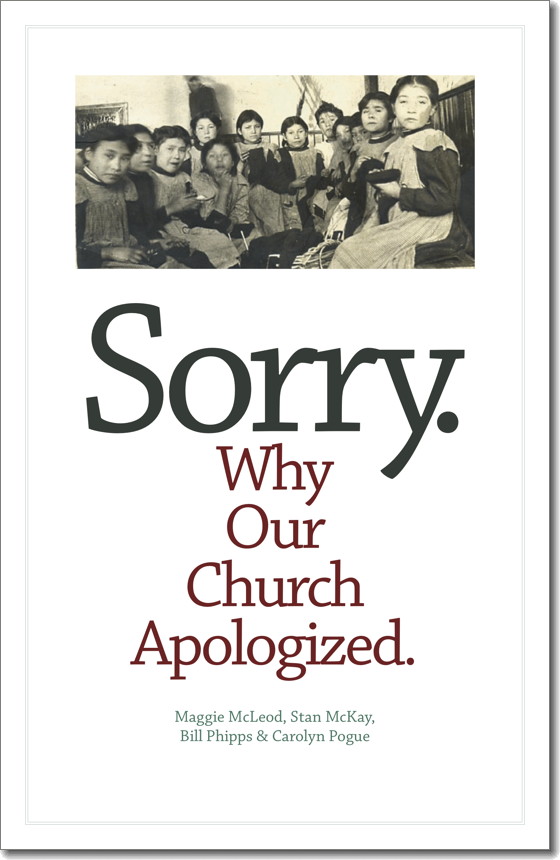
In 1986 the United Church of Canada issued an Apology to Native Peoples that began: "Long before my people journeyed to this land your people were here and you received from your Elders an understanding of creation and of the Mystery that surrounds us all that was deep, and rich, and to be treasured ..."
This was the first acknowledgement that Canada had been teaching a history that was not true.
In 1998, the United Church went further by issuing an Apology to Former Students of United Church Indian Residential Schools, and to the Families and Communities. It included these words: "On behalf of The United Church of Canada, I apologize for the pain and suffering that our church's involvement in the Indian Residential School system has caused. We are aware of some of the damage that this cruel and ill-conceived system of assimilation has perpetrated on Canada's First Nations peoples. For this we are truly and most humbly sorry ..."
The just-published book, Sorry. Why Our Church Apologized., tells how the church became involved in the schools and how it is that the church saw it must withdraw from the system, and become involved in learning and healing.
Sorry was written by four members of the United Church of Canada who have experience in bringing together Indigenous and non-Indigenous peoples, both inside and outside their church. Sorry was written as a response to invitations from elementary school students in Alberta who asked, "Why were churches involved in running these schools?" and "What did it feel like to apologize?"
The authors:
Reverend Maggie McLeod is from Peepeekisis First Nation. She now works for Aboriginal Ministries, United Church of Canada in Toronto.
Very Reverend Stan McKay was born on Fisher River Reserve and attended Birtle Indian Residential School, Manitoba. He is a retired United Church minister and former Moderator.
Very Reverend Bill Phipps from Toronto now lives in Calgary, Alberta. He is a retired United Church minister and former Moderator who is currently active on Climate justice issues.
Carolyn Pogue is the author of 14 books and writes "Sightings," a blog for The United Church Observer.
Published by Wood Lake, August 1, 2015
ISBN 978-1-77064-803-6
5.5" x 8.5" Paperback, 26 pages, $9.95
From the back cover:
Sometimes it is not so hard to say sorry. Sometimes it is very hard. What matters most is meaning it when you say it.
You likely know what it's like. You likely remember a
time when someone said sorry to you. Maybe you've heard
about a church saying sorry as well.
One surprising year, the United Church of Canada
people did just that. The church has members in
Newfoundland, Yukon and everywhere in between. The people who
attend have Asian, Indigenous, African and European ancestry
Canadians are from everywhere!
This is the story of why the United Church
people apologized for the suffering caused by
Indian Residential Schools..
The book is available in 4 formats:
As a print book, for $9.95 per copy. To order go HERE.
As a downloadable PDF, which can be printed. To download, click HERE.
As a web flipbook - see immediately below.
As a single web page - alse see below.
SORRY. WHY OUR CHURCH APOLOGIZED.
Contents
The Early Connections
Treaties and Residential Schools
Growing Awareness and the Sorry Feeling
From Sorry to Right Relations
Some Things to Think About
Appendices
Dedication
For the Children of Yesterday,
Today, and Tomorrow
Sometimes it is not so hard to say sorry. Sometimes it is
very hard. What matters most is meaning it when you say it.
You likely know what it's like to say sorry and mean
it. You likely remember a time when someone said sorry
to you. You might remember hearing news that a car
manufacturer or a food producer said sorry about a big mistake.
Maybe you've heard about a church saying sorry as well.
One surprising year, the United Church of Canada
people did just that. The church has members in
Newfoundland, Yukon, and everywhere in between. It's a Canadian
church and the people who attend have Asian, Indigenous,
African and European ancestry Canadians are from
everywhere! The United Church is one church made up of many
congregations. Possibly there is a United Church of Canada in
your own community.
This is the story of why the United Church people
apologized.
The Early Connections
Soon after Confederation in 1867, the Canadian
government had an idea of how to build up our country. They
wanted Canada to stretch from sea to sea to sea, and they wanted
to fill the land with settlers. They hoped to have a nation
of people who would make farms, start ranches, dig mines,
and build factories. The government people thought it would
be a good thing to encourage everyone to be the same; that
is, like them. They wanted Canadians to speak only English
or French. They wanted everyone to honour the Queen of
England. The government people wanted all people to
dress, think, and worship God as they did, and enjoy the
same sports, music, and art.
But the Indigenous peoples who lived in Canada
didn't fit with those descriptions. They dressed differently.
Women did not lace themselves into corsets or wear stiff
leather shoes. Men did not work in offices or factories.
Indigenous peoples enjoyed foods from the land that were
different. They had spiritual traditions that honoured Creator God
and their connection to land and to all life. They spoke
many different languages, rather than English or French.
The government saw these differences as a problem
to solve. They wrote treaties. A treaty is an agreement
between nations. Indigenous peoples who signed the treaties
believed that they were peace agreements between nations that
would benefit everyone. The government believed that the
treaties gave them special power over Indigenous people.
From the beginning, these different understandings about
treaties caused many problems about how to live together.
The government forced Indigenous peoples in much
of Canada to live on reserves. The government created laws
that gave themselves many advantages. One law prevented
Indigenous people from voting in Canadian government
elections. One law divided "Status Indian" from "Métis" and
gave different rules for each. Laws controlled how
Indigenous people farmed, sold produce, or made a living. One law
made it a crime for people to leave reserves without
permission. These laws were eventually changed. But one law lasted
a long time. It caused huge problems. It concerned children.
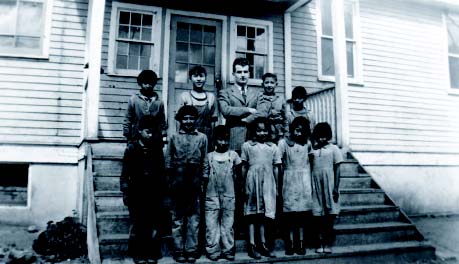
Whitewood, Saskatchewan, circa 1940, UCCA, 93.049P/116
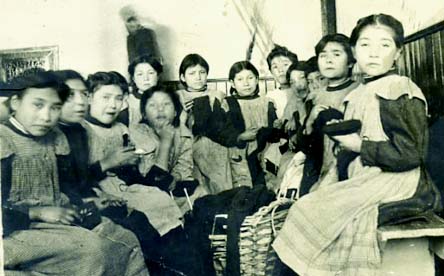
Norway House, Manitoba, circa 1910, UCCA, 93.049P/1261N
Treaties and Residential Schools
Treaty agreements included apromise by government
to provide education for Indigenous children. The schools
were meant to make the children be like the settler people.
Some were day schools. One hundred and thirty were
residential schools. This meant that children had to leave their
parents, their homes, and their pets for ten months of each year
and live at the school. Over the generations, about 150,000
children attended these schools.
The government asked the Anglican, Presbyterian,
Roman Catholic, and Methodist churches to run the
schools. (In 1925, the United Church of Canada took over the
responsibility for Methodist and some Presbyterian schools.)
The Roman Catholics ran 79 schools, the Presbyterians ran
two, the Anglicans ran 36, and the United Church ran 16.
The last United Church residential school closed in 1969.
The last residential school in Canada closed in 1996.
The government wanted the Indigenous children to
be taught so that they would forget their own languages,
stories, dances, and songs. They wanted the children to
forget their understanding of how God was present within
them and within their communities. In essence, they wanted
the children to forget their identities. At thattime, the
church people believed that assimilation was a good thing and
that they were helping Indigenous peoples "move into the future."
The government gave money to the churches to
hire teachers and buy food, school desks, clothing, and so
on. Church people also sent money to the schools. But
usually there wasn't enough money to run the schools properly.
Students often had to farm or garden to raise their food.
They were often hungry. School shoes and clothes often didn't
fit properly or were not warm enough.
Some teachersand supervisors were kind; they
wanted the best for the students. Some were mean. Some wrote
official letters to the government saying that the
residential schools were a bad idea. The letters told stories
ofneglect and abuse. Unfortunately the letter writers were
not believed,and some were even fired from their jobs.
For generations, Indigenous children were forced to
leave their families to attend residential schools. Some
travelled great distances by ship, truck, or railway. Some
Indigenous children died at the schools; nearly 6000 never went
home again. Although some went on to live happy lives, many
felt ashamed, angry, or sad for many years. Experiences of
childhood last a lifetime.
Most Canadians did not know about these schools
because the schools were located in places far removed
from larger towns and cities. Canadians did not understand
or didn't know what was going on. Not many people
thought about howwrong it was to take children away from
their parents, grandparents, and communities.
Over the years, non-Native church people began to
catch glimpses of what had been lost by not honouring the
culture and wisdom of Indigenous peoples. They also began
to understand how racism was not something happening
just in other countries; it was also right here in Canada.
Along with other churches, the United Church took part in
en-vironmental and social justice actions. For example
church people stood against the proposed Mackenzie Valley
pipeline because they learned from the Dene that the
pipeline would be dangerous to Earth and to the communities
along the pipeline route. Through relationships like this,
non-Native church people began to work with and learn from
In-digenous peoples, both inside and outside church.
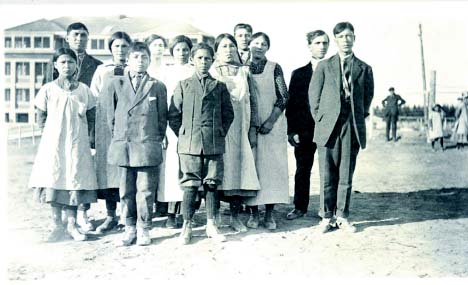
Norway House, Manitoba, between 1916 and 1921, UCCA, 93.049P/1269N
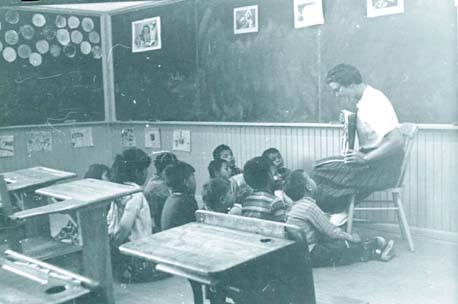
Norway House, Manitoba, circa 1950, UCCA, 93.049P/1243
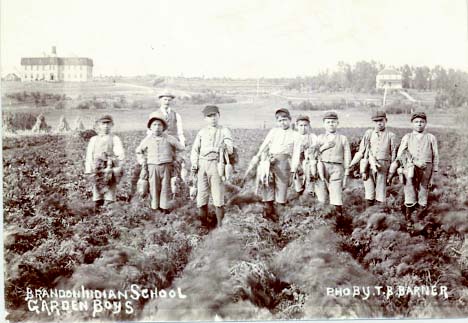
Brandon, Manitoba, 1902, UCCA, 93.049P/1363bS
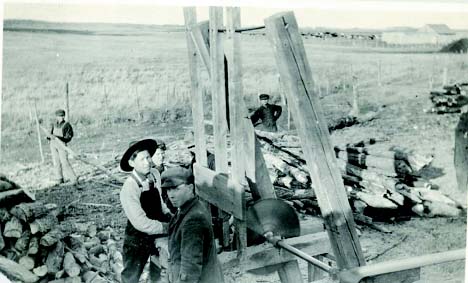
Red Deer, Alberta, 1919, UCCA, 93.049P/855N
Growing Awareness and the
Sorry Feeling
By 1986, United Church people were ready to say
sorry for not listening before. The United Church of Canada
leader, Moderator Reverend Bob Smith, said these words at a
national church meeting in Sudbury, Ontario:
"Long before my people journeyed to this land your
people were here, and you received from your Elders an
understanding of creation and of the Mystery that surrounds us all
that was deep, and rich, and to be treasured.
We did not hear you when you shared your vision. In
our zeal to tell you of the good news of Jesus Christ we
were closed to the value of your spirituality.
We confused Western ways and culture with the
depth and breadth and length and height of the gospel of
Christ. We imposed our civilization as a condition for accepting
the gospel.
We tried to make you be like us and in so doing we
helped to destroy the vision that made you what you were. As a
result you, and we, are poorer, and the image of the Creator
in us is twisted, blurred, and we are not what we are meant
by God to be.
We ask you to forgive us and to walk together with us
in the Spirit of Christ so that our peoples may be blessed
and God's creation healed."
When Reverend Smith said those words to Elder
Edith Memnook, she hugged him and said, "Thank you. I've
waited my whole life to hear those words." Yet she did not say,
"We forgive you." She and the Elders wanted to know more
about what the church meant by sorry. She wanted to know if
non-Native church people would repent, which means to
turn away from what is harmful and turn toward what is
good. Elder Memnook said that she and other Indigenous
peoples in our churches would help us. This began a very
exciting time to be in the United Church.
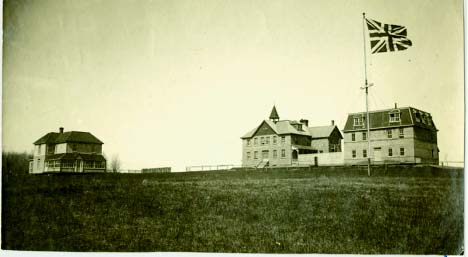
Red Deer, Alberta, circa 1900, UCCA, 93.049P/839
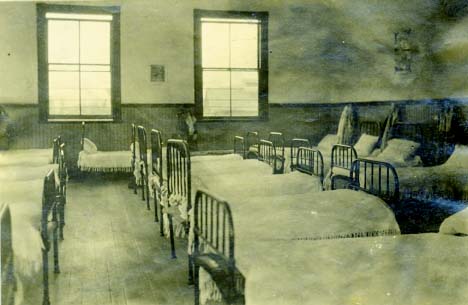
Chilliwack, British Columbia, circa 1920, UCCA, 93.049P/419
From Sorry to Right Relations
Non-Native church people went to workshops to learn
about Native spirituality. They began listening. They learned
about the effects of residential schools. They read books.
They watched videos and films about living in right
relationships with people, Earth, and all beings. They sat in circles,
listening to one another and working together to make
things right. They raised money for the church Healing Fund.
Indigenous communities use this very important fund to
reclaim culture and language that were lost during their
years at residential schools.
In 1992, the elected church leader was Moderator
Reverend Stan McKay, from Fisher River Cree Nation,
Manitoba. He had attended a residential school, and he had been
a teacher before becoming a minister. He knew that text
books and literature did not contain the whole truth of
Canadian history. He helped the United Church learn a bigger history.
Willie Blackwater was sent as a child to the Port
Alberni Indian Residential School on Vancouver Island. In 1994,
he said, "Canada needs to know what happened in the
school." It takes courage to speak out and let others know that
something is wrong. Willie's bravery led him to tell stories of
how frightened he was as a child because of the abuses he
experienced, and how that affected him even as a grown-up.
Willie went to court. He wanted a judge and jury to know about
these stories. Newspapers wrote articles about his testimony.
Radio and television reporters spread the story. Then other
brave former students began to come forward to tell their
stories too. The stories were very hard to tell and very hard to hear.
People across Canada were shocked. What would it
be like to have our children taken away? Did our
government really do this? Were the churches really involved? Were
the stories true? Were the schools so terrible? Did students
actually die at these schools?
Sometimes when we hear a scary story, we want to
cover our ears. If a story makes us feel guilty, we might
become angry. If we think that the truth of that story will cause
us to lose something precious, we might say that the
storyteller is lying. But sometimes, when stories are hard to hear,
we just feel sad and want to listen.
When churches started hearing all the stories about
kids being hurt, hungry, or beaten, people felt sad about all
of those things. No one wanted to believe that United
Church people had helped run schools that hurt families and
children. But we had to believe it because it was true.
Church people remembered how Jesus taught that the truth will
set us free, and we wanted freedom from sadness, guilt,
and anger.
The United Church people believed that they
especially needed to say sorry for hurt caused by these schools. In
1998, the elected church leader, Moderator Reverend Bill
Phipps, delivered these words:
"On behalf of the United Church of Canada, I apologize
for the pain and suffering that our involvement in the
Indian Residential School system has caused. We are aware of
some of the damage caused by this cruel system of
assimilation. We are truly and most humbly sorry. We are sorry that
some students were abused in these schools ... We know that
many within our church will still not understand why each of
us must bear the scar, the blame, for this horrendous period
in Canadian history. But the truth is, we are the bearers of
many blessings from our ancestors, and therefore, we must
also bear their burdens ..."
Since then, whenever they are invited, Moderators,
former Moderators, and other church leaders visit communities
to listen, learn, and offer the Apology in the hopes of
building the type of relationship God wants for us.
That is why the United Church people said sorry. That
is why other churches have said sorry too. We are part of
a long history of misdeeds that hurt many of the people
whose ancestors welcomed settlers to this land. Church people
want to live in right relationship now. This means living with
respect, wisdom, love, humility, truth, honesty, and courage.
By 2007, there were more and more law suits by
former residential school students against the government and
the churches. How could the government and the churches
settle these? The court brought together Indigenous
people, church and government representatives, and lawyers to
find a solution. They reached "The Settlement Agreement."
This laid out a plan to create a Truth and Reconciliation
Commission. The Commission's tasks were to make sure that
Canadians could learn the true history of our country and
to find ways to reconcile. To reconcile means to make peace
or to bring back together again.
In 2008, the government of Canada invited Inuit,
Métis, and First Nation leaders to Ottawa. On June 11, in front
of everyone in the House of Commons (in fact, in front of
all Canada), on behalf of the government, the prime
minister also said sorry. Many church people were present to
witness this historic event.
From 2009 until 2015, the Truth and
Reconciliation Commission travelled all around Canada. Chief
Willie Littlechild, Dr. Marie Wilson, and Justice Murray
Sinclair served as commissioners. Their job was to listen to
stories about what happened in the residential schools. They
listened to thousands of former students, teachers, and
workers. The United Church of Canada helped to support
this important work so that everyone would know the true
history of our land.
In 2012, Aboriginal ministries in the United
Church asked that the church crest be changed. The new crest
has the colours of the medicine wheel and includes the
Mohawk phrase Akwe Nia'Tetewá:neren (aw gway nyah day day
waw nay renh), which means "all my relations." These
changes help to show that the church respects Indigenous peoples.
Saying sorry is one step in the healing journey
for Canada. This is an exciting time for our country. The
next step is up to each of us. We are all in this together.
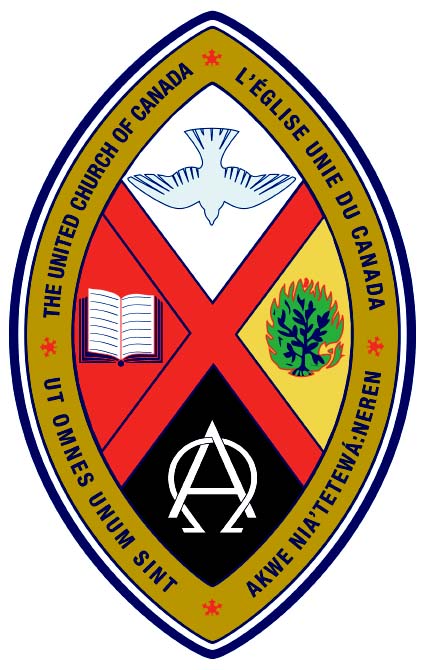 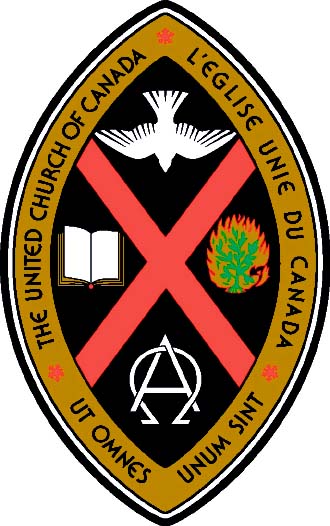
Some Things to Think About
What do you do when someone apologizes to you?
How can you tell when an apology is real?
What did Jesus say about sorry?
What do you do after you say sorry?
How do you celebrate National Aboriginal Day in your community?
Appendix 1
A letter from Stan McKay,
teacher, ordained minister, former Moderator of the United Church of Canada,
and former Residential School student.
My name is Stan McKay and I am a Cree person. Growing
up on the Fisher River Reserve, along the western shore of
Lake Winnipeg in Manitoba, our family made our own living
65 years ago. My mother had a garden, she milked a cow,
and we had a few chickens for eggs. She sewed our clothes,
and our neighbor made beaded moosehide slippers and mitts
for us to wear. We had no road into our village, but there was
a small store where we could buy flour, salt, tea, and oil
for our lamps. My father was often away from home
fishing, hunting, and trapping. He built the small log houses we
lived in. We lived near my grandparents and we had many
relatives living nearby.
I walked two kilometres to a school that my parents
had also attended. It was near a mission church that became
a part of the United Church of Canada. I knew my
grandmother and grandfather had spent their entire childhood
in a residential school but they never talked about it. When
I finished grade eight in the Fisher River School, I was told
I had to go to a residential school, which was 500
kilometres away. I was there for five years. It was a time of great
loneliness and I had some very painful experiences.
Even after spending most of her childhood in a
residential school, my grandmother was an active member of
the United Church, and she encouraged me to become a
minister. Her name was Louise and she taught me about
being respectful of all people. She and other members of my
family helped me survive the residential school experience,
but healing is a lifelong journey.
I became a school teacher after I left the residential
school and I taught for three years in Cree Indian day schools
in northern Manitoba. Then I returned to spend six years
in university, and in 1971 I became a United Church
minister. I returned to work in Cree United churches in
Manitoba, including seven years in my birthplace at Fisher River.
In 1991 friends asked that I let my name stand in
nomination for the position of Moderator of the United Church
of Canada. I was elected as Moderator in August of 1992.
I learned that many of the United Church
congregations did not know about Indigenous peoples and did not
understand how we feel inside. Many people wanted to change
us to be like them, but we have our own stories and ways
of prayer.
My dream for children today is that you may learn
to care for each other and understand that we are all related
to each other. The United Church crest now has "All My
Relations" printed on it, which means that we are related to
each other and to all of creation. There is great joy in sharing
life with thanksgiving and I wish you would dance on the
earth in large circles that include everyone.
Appendix 2
Apology to Former Students of
United Church Indian Residential Schools, and to their Families and Communities.
As Moderator of The United Church of Canada, I wish
to speak the words that many people have wanted to hear for
a very long time. On behalf of The United Church of
Canada, I apologize for the pain and suffering that our church's
involvement in the Indian Residential School system
has caused. We are aware of some of the damage that this
cruel and ill-conceived system of assimilation has perpetrated
on Canada's First Nations peoples. For this we are truly
and most humbly sorry.
To those individuals who were physically, sexually,
and mentally abused as students of the Indian
Residential Schools in which The United Church of Canada was
involved, I offer you our most sincere apology. You did nothing
wrong. You were and are the victims of evil acts that cannot
under any circumstances be justified or excused.
We know that many within our church will still not
understand why each of us must bear the scar, the blame,
for this horrendous period in Canadian history. But the
truth is, we are the bearers of many blessings from our
ancestors, and therefore, we must also bear their burdens.
Our burdens include dishonouring the depths of
the struggles of First Nations peoples and the richness of
your gifts. We seek God's forgiveness and healing grace as we
take steps toward building respectful, compassionate, and
loving relationships with First Nations peoples.
We are in the midst of a long and painful journey as
we reflect on the cries that we did not or would not hear,
and how we have behaved as a church. As we travel this
difficult road of repentance, reconciliation, and healing, we
commit ourselves to work toward ensuring that we will never
again use our power as a church to hurt others with attitudes
of racial and spiritual superiority.
We pray that you will hear the sincerity of our words
today and that you will witness the living out of our
apology in our actions in the future.
The Right Rev. Bill Phipps
Moderator of The United Church of Canada
October 1998
Appendix 3
United Church-run Schools
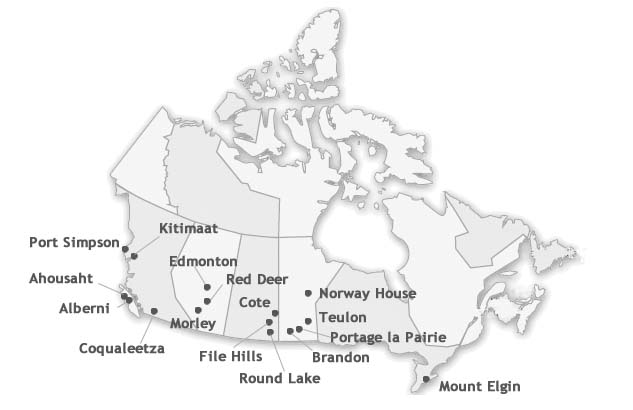
Appendix 4
Project of Heart
Schools and church schools throughout Canada are using
the Project of Heart curriculum to help this generation
learn about the history of Canada.
Project of Heart is an educational tool kit designed
to engage students in a deeper exploration of indigenous
traditions in Canada and the history of Indian
residential schools. It is a journey for understanding through the
heart and spirit as well as through facts and dates.
Project of Heart was started by Sylvia Smith, a
teacher in Ottawa, Ontario. She wanted to commemorate the
lives of the thousands of Indigenous children who died as a
result of the residential school experience. Elders from
First Nation, Metis, and Inuit communities become regular
participants in classroom presentations and discussions.
Some classes also invite church representatives to share
their knowledge of how and why the churches helped to run
the schools and to talk about the Apologies.
To learn more about the project, videos and a list of
recommended resources, please visit:
The Authors
Stanley McKay was born on Fisher River Reserve, a Cree community. He
attended Birtle Indian Residential School, then went to Teachers College to
become a teacher. Later he went to the University of Winnipeg to obtain a
degree in Theology and worked with the United Church of Canada. He was
Moderator from 1992 to 1994. He is married, with three grown children and enjoys
fishing in the creek with his three grandchildren.
Maggie McLeod is a Cree woman from the Treaty 4 area (Peepeekisis First
Nation) She grew up in Saskatchewan, then moved to Saugeen Ojibwa
Territory (Ontario) where she raised daughters Nancy and Natasha.The United
Church of Canada has been important in Maggie's life. She is an intergenerational
survivor of the residential school system. Maggie's father Wilfred Dieter
attended File Hills Residential School and his parents, Fred Dieter and Marybelle
Cote, attended Regina Industrial School. Maggie loves to spend time with her
grandchildren Whitney, Isaac, Cayson, and Jack, and take long walks with her camera.
Bill Phipps grew up in Toronto, Ontario. He became a lawyer, teacher,
minister and served the United Church in Toronto, Edmonton and Calgary. He was
Moderator from 1997 to 2000. He loves canoeing, the Blue Jays, hiking, and
reading. He's active in Climate Justice, Right Relations, Calgary Peace Prize. He
enjoys playing catch with his children and grandchildren who live in Yellowknife,
Winnipeg and Toronto. www.billphipps.ca
Carolyn Pogue grew up on a farm near Toronto, Ontario. She is the author of
15 books for children, teens and adults. She is part of a group of women in
The United Church working to end child poverty. She loves canoeing, camping
and making art with Michael, Kate, Tristan, Foster and other kids. She writes a
blog for The United Church Observer. She lives in Treaty 7
territory. www.carolynpogue.ca
Thanks to:
The students and teachers at Sarah Thompson Elementary School,
Langdon, Alberta, and Glenbow Elementary School, Cochrane, Alberta
for compassionate listening and wise questions.
Reverend Cecile Fausak and Dot McKay.
General Council staff and The Archive at the United Church of Canada.
The staff at Wood Lake Publishing, who know how to fast dance.
WOOD LAKE PUBLISHING
Imagining, living and telling the faith story.

WOOD LAKE IS THE FAITH STORY COMPANY.
It has told:
The story of the seasons of the earth, the
people of God, and the place and purpose of faith
in the world
The story of the faith journey, from birth
to death
The story of Jesus and the churches that
carry his message.
Wood Lake has been telling stories for more
than 30 years. During that time, it has given form
and substance to the words, songs, pictures and
ideas of hundreds of storytellers.
Those stories have taken a multitude of forms
- parables, poems, drawings, prayers,
epiphanies, songs, books, paintings, hymns, curricula -
all driven by a common mission of serving those on the faith journey.
Wood Lake is proud of its long association
with the United Church of Canada. It has provided publication and learning resources to
hundreds of United Churches and has partnered with
UCC in the publication of the More Voices hymnal.
Editor and Proofreader: Ellen Turnbull
Designer: Robert MacDonald
Printing Production: Kailee Thorne
Library and Archives Canada Cataloguing in Publication
A catalogue entry for this book is available from Library and Archives Canada
Copyright © 2015 Maggie McLeod, Stan McKay, Bill Phipps & Carolyn Pogue.
All rights reserved. No part of this publication may be reproduced except
in the case of brief quotations embodied in critical articles and reviews
stored in an electronic retrieval system, or transmitted in any form or by any
means, electronic, mechanical, photocopying, recording, or otherwise, without
prior written permission of the publisher or copyright holder.
"Apology to First Nations Peoples (1986)" and "Apology to Former Students
of United Church Indian Residential Schools, and to Their Families and
Communities (1998)" are reprinted with permission of The United Church of Canada.
ISBN 978-1-77064-803-6
Published by Wood Lake Publishing Inc.
485 Beaver Lake Road, Kelowna, BC, Canada, V4V 1S5
www.woodlake.com | 250.766.2778
We acknowledge the financial support of the Government of Canada.
Nous reconnaissons l'appui financier du gouvernement du Canada. Wood
Lake Publishing acknowledges the financial support of the Province of
British Columbia through the Book Publishing Tax Credit.
At Wood Lake Publishing, we practice what we publish, being guided by
a concern for fairness, justice, and equal opportunity in all of our
relationships with employees and customers. Wood Lake Publishing is committed to
caring for the environment and all creation. Wood Lake Publishing recycles
and reuses, and encourages readers to do the same. Books are printed on
100% post-consumer recycled paper, whenever possible. A percentage of all profit
is donated to charitable organizations.
|
|
|



